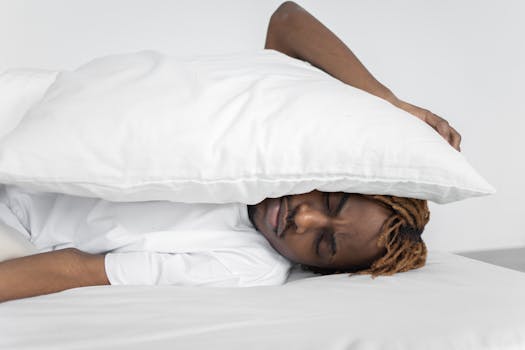
Creating a Balanced Sleep Routine for Better Rest – WordPress
Creating a balanced sleep routine is essential for better rest and improved overall health. A well-structured sleep routine can help regulate your body’s internal clock, improve the quality of your sleep, and increase your energy levels. In this article, we will discuss the importance of a balanced sleep routine and provide tips on how to create one.
Why is a Balanced Sleep Routine Important?
A balanced sleep routine is crucial for maintaining good physical and mental health. During sleep, our body repairs and regenerates damaged cells, builds bone and muscle, and strengthens our immune system. A lack of sleep or poor sleep quality can lead to a range of health problems, including obesity, diabetes, cardiovascular disease, and depression.
How to Create a Balanced Sleep Routine
Creating a balanced sleep routine involves establishing a consistent sleep schedule, creating a relaxing bedtime routine, and optimizing your sleep environment. Here are some tips to help you create a balanced sleep routine:
- Go to bed and wake up at the same time every day, including weekends.
- Establish a relaxing bedtime routine, such as reading a book or taking a warm bath.
- Create a sleep-conducive environment, such as keeping your bedroom cool, dark, and quiet.
- Avoid caffeine, nicotine, and electronic devices before bedtime.
- Get regular exercise, but not before bedtime.
- Manage stress and anxiety through techniques such as meditation or deep breathing.
Additional Tips for a Balanced Sleep Routine
In addition to establishing a consistent sleep schedule and creating a relaxing bedtime routine, there are several other tips that can help you create a balanced sleep routine. These include:
- Avoid heavy meals close to bedtime.
- Limit your exposure to screens and electronic devices before bed.
- Try to clear your mind and relax before bed, rather than thinking about work or other stressors.
- Consider keeping a sleep diary to track your sleep patterns and identify areas for improvement.
Conclusion
Creating a balanced sleep routine is essential for better rest and improved overall health. By establishing a consistent sleep schedule, creating a relaxing bedtime routine, and optimizing your sleep environment, you can improve the quality of your sleep and wake up feeling rested and refreshed. Remember to also avoid caffeine, nicotine, and electronic devices before bedtime, and try to manage stress and anxiety through techniques such as meditation or deep breathing.
Focus Keyword: Creating a Balanced Sleep Routine
By following these tips and creating a balanced sleep routine, you can improve your overall health and well-being. Remember to prioritize sleep and make it a priority in your daily routine.
WordPress Sleep Routine Plugin
There are several WordPress sleep routine plugins available that can help you create a balanced sleep routine. These plugins can track your sleep patterns, provide reminders and alerts, and offer tips and advice on how to improve your sleep quality.
Sleep Routine Apps
In addition to WordPress sleep routine plugins, there are also several sleep routine apps available that can help you create a balanced sleep routine. These apps can track your sleep patterns, provide personalized recommendations, and offer guided relaxation techniques to help you fall asleep.
Sleep Routine Products
There are also several sleep routine products available that can help you create a balanced sleep routine. These products include sleep masks, earplugs, and white noise machines, which can help create a sleep-conducive environment and improve the quality of your sleep.
Sleep Routine Tips for Different Age Groups
Sleep routine tips can vary depending on your age group. For example, infants and toddlers require a lot of sleep, while older adults may require less sleep. Here are some sleep routine tips for different age groups:
- Infants and toddlers: Establish a consistent sleep schedule, create a sleep-conducive environment, and avoid overstimulation before bedtime.
- Children and adolescents: Encourage a consistent sleep schedule, create a relaxing bedtime routine, and limit exposure to screens and electronic devices before bed.
- Young adults: Establish a consistent sleep schedule, create a sleep-conducive environment, and avoid caffeine, nicotine, and electronic devices before bedtime.
- Older adults: Encourage a consistent sleep schedule, create a relaxing bedtime routine, and limit exposure to screens and electronic devices before bed.
Sleep Routine and Mental Health
Sleep routine can have a significant impact on mental health. Poor sleep quality or lack of sleep can contribute to anxiety, depression, and other mental health disorders. Here are some tips for improving sleep routine and mental health:
- Establish a consistent sleep schedule.
- Create a relaxing bedtime routine.
- Limit exposure to screens and electronic devices before bed.
- Avoid caffeine, nicotine, and other stimulants before bedtime.
- Try relaxation techniques such as meditation or deep breathing.
Sleep Routine and Physical Health
Sleep routine can also have a significant impact on physical health. Poor sleep quality or lack of sleep can contribute to a range of health problems, including obesity, diabetes, and cardiovascular disease. Here are some tips for improving sleep routine and physical health:
- Establish a consistent sleep schedule.
- Create a sleep-conducive environment.
- Avoid heavy meals close to bedtime.
- Limit exposure to screens and electronic devices before bed.
- Try to get regular exercise, but not before bedtime.
Sleep Routine and Weight Management
Sleep routine can also have an impact on weight management. Poor sleep quality or lack of sleep can contribute to weight gain and obesity. Here are some tips for improving sleep routine and weight management:
- Establish a consistent sleep schedule.
- Create a sleep-conducive environment.
- Avoid heavy meals close to bedtime.
- Limit exposure to screens and electronic devices before bed.
- Try to get regular exercise, but not before bedtime.
Sleep Routine and Fitness
Sleep routine can also have an impact on fitness. Poor sleep quality or lack of sleep can contribute to decreased physical performance and reduced muscle recovery. Here are some tips for improving sleep routine and fitness:
- Establish a consistent sleep schedule.
- Create a sleep-conducive environment.
- Avoid heavy meals close to bedtime.
- Limit exposure to screens and electronic devices before bed.
- Try to get regular exercise, but not before bedtime.
Sleep Routine and Nutrition
Sleep routine can also have an impact on nutrition. Poor sleep quality or lack of sleep can contribute to decreased appetite regulation and increased cravings for unhealthy foods. Here are some tips for improving sleep routine and nutrition:
- Establish a consistent sleep schedule.
- Create a sleep-conducive environment.
- Avoid heavy meals close to bedtime.
- Limit exposure to screens and electronic devices before bed.
- Try to get regular exercise, but not before bedtime.
Sleep Routine and Lifestyle
Sleep routine can also have an impact on lifestyle. Poor sleep quality or lack of sleep can contribute to decreased productivity, reduced creativity, and increased stress levels. Here are some tips for improving sleep routine and lifestyle:
- Establish a consistent sleep schedule.
- Create a sleep-conducive environment.
- Avoid heavy meals close to bedtime.
- Limit exposure to screens and electronic devices before bed.
- Try to get regular exercise, but not before bedtime.
Sleep Routine and Work-Life Balance
Sleep routine can also have an impact on work-life balance. Poor sleep quality or lack of sleep can contribute to decreased productivity, reduced job satisfaction, and increased stress levels. Here are some tips for improving sleep routine and work-life balance:
- Establish a consistent sleep schedule.
- Create a sleep-conducive environment.
- Avoid heavy meals close to bedtime.
- Limit exposure to screens and electronic devices before bed.
- Try to get regular exercise, but not before bedtime.
Sleep Routine and Relationships
Sleep routine can also have an impact on relationships. Poor sleep quality or lack of sleep can contribute to decreased communication, reduced empathy, and increased conflict. Here are some tips for improving sleep routine and relationships:
- Establish a consistent sleep schedule.
- Create a sleep-conducive environment.
- Avoid heavy meals close to bedtime.
- Limit exposure to screens and electronic devices before bed.
- Try to get regular exercise, but not before bedtime.
Sleep Routine and Personal Growth
Sleep routine can also have an impact on personal growth. Poor sleep quality or lack of sleep can contribute to decreased motivation, reduced self-awareness, and increased self-doubt. Here are some tips for improving sleep routine and personal growth:
- Establish a consistent sleep schedule.
- Create a sleep-conducive environment.
- Avoid heavy meals close to bedtime.
- Limit exposure to screens and electronic devices before bed.
- Try to get regular exercise, but not before bedtime.
Sleep Routine and Spirituality
Sleep routine can also have an impact on spirituality. Poor sleep quality or lack of sleep can contribute to decreased connection to oneself, others, and a higher power. Here are some tips for improving sleep routine and spirituality:
- Establish a consistent sleep schedule.
- Create a sleep-conducive environment.
- Avoid heavy meals close to bedtime.
- Limit exposure to screens and electronic devices before bed.
- Try to get regular exercise, but not before bedtime.
Sleep Routine and Technology
Sleep routine can also have an impact on technology use. Poor sleep quality or lack of sleep can contribute to increased screen time, decreased productivity, and reduced digital well-being. Here are some tips for improving sleep routine and technology use:
- Establish a consistent sleep schedule.
- Create a sleep-conducive environment.
- Avoid heavy meals close to bedtime.
- Limit exposure to screens and electronic devices before bed.
- Try to get regular exercise, but not before bedtime.
Sleep Routine and Travel
Sleep routine can also have an impact on travel. Poor sleep quality or lack of sleep can contribute to decreased enjoyment, reduced cultural immersion, and increased stress levels. Here are some tips for improving sleep routine and travel:
- Establish a consistent sleep schedule.
- Create a sleep-conducive environment.
- Avoid heavy meals close to bedtime.
- Limit exposure to screens and electronic devices before bed.
- Try to get regular exercise, but not before bedtime.
Sleep Routine and Education
Sleep routine can also have an impact on education. Poor sleep quality or lack of sleep can contribute to decreased academic performance, reduced cognitive function, and increased stress levels. Here are some tips for improving sleep routine and education:
- Establish a consistent sleep schedule.
- Create a sleep-conducive environment.
- Avoid heavy meals close to bedtime.
- Limit exposure to screens and electronic devices before bed.
- Try to get regular exercise, but not before bedtime.
Sleep Routine and Career
Sleep routine can also have an impact on career. Poor sleep quality or lack of sleep can contribute to decreased productivity, reduced job satisfaction, and increased stress levels. Here are some tips for improving sleep routine and career:
- Establish a consistent sleep schedule.
- Create a sleep-conducive environment.
- Avoid heavy meals close to bedtime.
- Limit exposure to screens and electronic devices before bed.
- Try to get regular exercise, but not before bedtime.
Sleep Routine and Entrepreneurship
Sleep routine can also have an impact on entrepreneurship. Poor sleep quality or lack of sleep can contribute to decreased innovation, reduced creativity, and increased stress levels. Here are some tips for improving sleep routine and entrepreneurship:
- Establish a consistent sleep schedule.
- Create a sleep-conducive environment.
- Avoid heavy meals close to bedtime.
- Limit exposure to screens and electronic devices before bed.
- Try to get regular exercise, but not before bedtime.
Sleep Routine and Small Business
Sleep routine can also have an impact on small business. Poor sleep quality or lack of sleep can contribute to decreased productivity, reduced customer satisfaction, and increased stress levels. Here are some tips for improving sleep routine and small business:
- Establish a consistent sleep schedule.
- Create a sleep-conducive environment.
- Avoid heavy meals close to bedtime.
- Limit exposure to screens and electronic devices before bed.
- Try to get regular exercise, but not before bedtime.
Sleep Routine and Non-Profit
Sleep routine can also have an impact on non-profit. Poor sleep quality or lack of sleep can contribute to decreased productivity, reduced donor satisfaction, and increased stress levels. Here are some tips for improving sleep routine and non-profit:
- Establish a consistent sleep schedule.
- Create a sleep-conducive environment.
- Avoid heavy meals close to bedtime.
- Limit exposure to screens and electronic devices before bed.
- Try to get regular exercise, but not before bedtime.
Sleep Routine and Government
Sleep routine can also have an impact on government. Poor sleep quality or lack of sleep can contribute to decreased productivity, reduced citizen satisfaction, and increased stress levels. Here are some tips for improving sleep routine and government:
- Establish a consistent sleep schedule.
- Create a sleep-conducive environment.
- Avoid heavy meals close to bedtime.
- Limit exposure to screens and electronic devices before bed.
- Try to get regular exercise, but not before bedtime.





